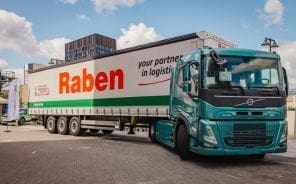Logistics service provider initiates pilot project on electric mobility with IKEA and Volvo
Raben Group wants to promote the transport revolution and sees great potential in
e-mobility. That is why the European logistics service provider has started a pilot
project together with IKEA Industry and Volvo Trucks in Poland, which should
significantly reduce CO2 emissions. From autumn onwards, electric trucks Volvo
FM will be used in the factory transport of the Swedish furniture manufacturer
IKEA. They will shuttle between the Zbaszynek and Babimost factories in western
Poland, which are 12 kilometres apart. On average, one truck makes 14 trips a day.
Raben uses the all-electric tractor unit to transport furniture components, spare
parts and materials for production for IKEA. The Volvo FM Electric with a gross
train weight of 24 tonnes has a battery capacity of up to 490 kilowatt hours and a
range of up to 300 kilometres when fully loaded. The aim of the project is to
increase the efficiency of the transport flow with the help of the electrified trucks.
Shared knowledge about the challenges and opportunities of introducing and
transforming electrified transport operations will be used for the electrification of
Raben’s European transport network.
“For Raben Group, this project is the first step towards decarbonising the fleet in order to
achieve the ambitious CO2 reduction targets,” says Raben Transport Managing Director
Piotr Banasiak. The pilot project is scheduled to run for two years.
Raben significantly reduces operating costs with the Volvo FM Eletric
Quiet, emission-free, fast and manoeuvrable: With the all-electric Volvo FM Electric, Raben
is always able to ensure a continuous and efficient flow of goods for IKEA. The furniture
components can thus be provided at the right time and in the desired quantity at any time.
Due to its high efficiency and low maintenance costs compared to diesel vehicles, Raben
can also significantly reduce operating costs. The company expects to reduce CO2
emissions by 80 tonnes per year and truck.Besides a lower carbon footprint on the route,
we aim to learn together about challenges and opportunities in the deployment and
transformation of electrified transport operations at scale and its interdependencies in a
larger transport network. Another important factor is the improved efficiency in the transport
flow using electrified trucks. With direct current, the battery can be quickly charged up to
80 percent in just two hours. To increase the overall efficiency of the drive, the excess
energy from braking is used to recharge the batteries. IKEA obtains its electricity from
renewable sources. In addition, the company is planning its own photovoltaic plant with a
capacity of 19 megawatts for the plant’s own needs.
Raben has joined the SBTi initiative
The pilot project with IKEA Industry and Volvo Trucks is an important component of
Raben’s corporate strategy to reduce CO2 emissions from transport and from the
maintenance of buildings and warehouse infrastructure by 38,7% percent by 2030
compared to 2020. Therefore, the logistics service provider has joined the international
initiative “Science Based Targets initiative (SBTi)”. By joining, Raben commits to setting its
short-term decarbonisation targets. These have already been reviewed by SBTi experts.
In this context, Raben also wants to involve regular hauliers in climate protection by 2026
and set them emission reduction targets. “The set reduction based on the SBTi
methodology is just the beginning. To reach our targets, we also need to involve all our
partners in the entire supply chain,” says Ewelina Jablonska-Gryzenia, Head of
Sustainability.

